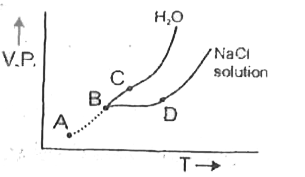The freezing point of an aqueous solution of KCN containing 0.1892molKg−1, the freezing point of the solution was found to be −0.530∘C. If the complex formation takes place according to the following equation:
Hg(CN)2, the freezing point of the solution was found to be −0.530∘C. If the complex formation takes place according to the following equation:
Hg(CN)2+nKCN⇔Kn[Hg(CN)n+2]
what is the formula of the complex? [Kf(H2O) is 1.86Kkgmol−1]
To solve the problem, we will follow these steps:
Step 1: Understanding the Freezing Point Depression
The freezing point depression (ΔTf) can be calculated using the formula:
ΔTf=Kf⋅i⋅m
where:
- Kf is the cryoscopic constant of the solvent (for water, Kf=1.86K kg mol−1),
- i is the van 't Hoff factor (number of particles the solute dissociates into),
- m is the molality of the solution.
Step 2: Calculate the van 't Hoff Factor for KCN
Given:
- The molality of KCN solution = 0.1892 mol/kg
- The observed freezing point depression = −0.530∘C
Using the formula:
ΔTf=Kf⋅i⋅m
Substituting the known values:
0.530=1.86⋅i⋅0.1892
Step 3: Solve for i
Rearranging the equation to solve for i:
i=0.5301.86⋅0.1892
Calculating i:
i=0.5300.351192≈1.51
Step 4: Determine the Degree of Ionization
For KCN, which dissociates into K+ and CN−:
i=1+α
Where α is the degree of ionization. Thus:
1.51=1+α⟹α=0.51
This indicates that KCN is partially ionized.
Step 5: Analyze the Complex Formation
For the complex formation:
Hg(CN)2+nKCN⇌Kn(Hg(CN)n+2)
Let’s denote the molality of the complex as mc and the observed freezing point depression for the complex as −0.530∘C.
Step 6: Set Up the Equation for the Complex
Using the same freezing point depression formula for the complex:
ΔTf=Kf⋅ic⋅mc
Where mc=0.095mol/kg (given).
Step 7: Calculate the van 't Hoff Factor for the Complex
Assuming the complex dissociates into n+2 particles:
ic=n+2
Substituting into the freezing point depression equation:
0.530=1.86⋅(n+2)⋅0.095
Step 8: Solve for n
Rearranging gives:
n+2=0.5301.86⋅0.095
Calculating:
n+2=0.5300.1767≈3
Thus:
n=3−2=1
Step 9: Write the Formula of the Complex
Substituting n=2 back into the complex formation equation gives:
K2(Hg(CN)4)
Thus, the formula of the complex is:
K2(Hg(CN)4)
Final Answer
The formula of the complex is K2(Hg(CN)4).
---
The freezing point depression (ΔTf) can be calculated using the formula:
ΔTf=Kf⋅i⋅m
where:
- Kf is the cryoscopic constant of the solvent (for water, Kf=1.86K kg mol−1),
- i is the van 't Hoff factor (number of particles the solute dissociates into),
- m is the molality of the solution.
Given:
- The molality of KCN solution = 0.1892 mol/kg
- The observed freezing point depression = −0.530∘C
ΔTf=Kf⋅i⋅m
Substituting the known values:
0.530=1.86⋅i⋅0.1892
Rearranging the equation to solve for i:
i=0.5301.86⋅0.1892
Calculating i:
i=0.5300.351192≈1.51
For KCN, which dissociates into K+ and CN−:
i=1+α
Where α is the degree of ionization. Thus:
1.51=1+α⟹α=0.51
This indicates that KCN is partially ionized.
For the complex formation:
Hg(CN)2+nKCN⇌Kn(Hg(CN)n+2)
Let’s denote the molality of the complex as mc and the observed freezing point depression for the complex as −0.530∘C.
Using the same freezing point depression formula for the complex:
ΔTf=Kf⋅ic⋅mc
Where mc=0.095mol/kg (given).
Assuming the complex dissociates into n+2 particles:
ic=n+2
Substituting into the freezing point depression equation:
0.530=1.86⋅(n+2)⋅0.095
Rearranging gives:
n+2=0.5301.86⋅0.095
Calculating:
n+2=0.5300.1767≈3
Thus:
n=3−2=1
Substituting n=2 back into the complex formation equation gives:
K2(Hg(CN)4)
Thus, the formula of the complex is:
K2(Hg(CN)4)
The formula of the complex is K2(Hg(CN)4).
Topper's Solved these Questions
- SOLUTIONSBOOK - CENGAGE CHEMISTRY ENGLISHCHAPTER - SOLUTIONSEXERCISE - Solved Examples
40 Videos
- SOLUTIONSBOOK - CENGAGE CHEMISTRY ENGLISHCHAPTER - SOLUTIONSEXERCISE - Exercises (Linked Comprehension)
58 Videos
- SOLID STATEBOOK - CENGAGE CHEMISTRY ENGLISHCHAPTER - SOLID STATEEXERCISE - Ex 1.2 (Objective)
9 Videos
- SURFACE CHEMISTRYBOOK - CENGAGE CHEMISTRY ENGLISHCHAPTER - SURFACE CHEMISTRYEXERCISE - Archives Subjective
2 Videos
Similar Questions
Knowledge Check
The lowest freezing point of 0.1 M aqueous solution is of:
AK2SO4BNaClCUreaDGlucose
Which of the following solutions has the maximum freezing point?
View SolutionWhich of the following solutions has the minimum freezing point
View SolutionThe freezing point of 0.05 m solution of glucose in water is (K1=1.86°Cm−1)
View Solution0.1 M aqueous solution of K4[Fe(CN)6] will have the same freezing point as 0.1 M aqueous solution of
View SolutionThe freezing poing of an aqueous solution of a non-electrolyte is −0.14∘C. The molality of this solution is [Kf(H2O)=1.86kgmol−1]:
View SolutionThe freezing point of an aqueous solution of KCN containing 0.1892 mole/kgH2O was −0.704∘C. On adding 0.095 mole of Hg(CN)2, the freezing point of solution was −0.53∘C. Assuming that complex is formed according to the reaction
Hg(CN)2+xCN−→Hg(CN)x−x+2
and also Hg(CN)2 is limiting reagent, find x.
View SolutionWhich of the following aqueous solutions will have the lowest freezing point ?
View Solution

